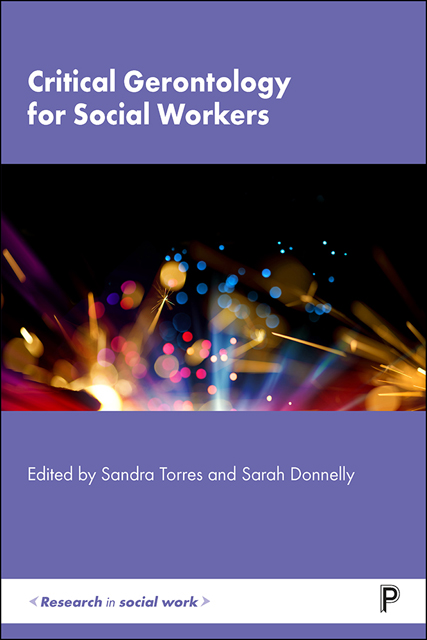Book contents
- Frontmatter
- Contents
- List of figures and tables
- Notes on contributors
- Acknowledgements
- Preface
- 1 Social work and critical gerontology: why the former needs the latter
- Part I Critical gerontology as guiding principles for social work with older people
- Part II Applying the critical gerontological lens to social work research, policy and practice
- Index
9 - Elder abuse
Published online by Cambridge University Press: 13 October 2022
- Frontmatter
- Contents
- List of figures and tables
- Notes on contributors
- Acknowledgements
- Preface
- 1 Social work and critical gerontology: why the former needs the latter
- Part I Critical gerontology as guiding principles for social work with older people
- Part II Applying the critical gerontological lens to social work research, policy and practice
- Index
Summary
Over the last 20 years, increased public and political awareness has developed alongside research, policy and professional developments to advance our understanding of the abuse of older people in families, communities, hospitals and institutional settings. In 2002, the World Health Organization (WHO) argued that elder abuse was a distinct social problem, defining abuse as ‘a single, repeated act or lack of appropriate action, occurring within any relationship where there is an expectation of trust which caused harm or distress to an older person’ (WHO, 2002).
In 2007, the first United Kingdom (UK) prevalence study of elder abuse reported that 4% of older people living in the community were subject to abuse or neglect (O’Keefe et al, 2007). In 2010, a prevalence study of elder abuse in Germany, Greece, Italy, Lithuania, Portugal, Spain and Sweden found that 19.4% of older people aged 60– 84 years were exposed to psychological abuse; 2.7% to physical abuse; 0.7% to sexual abuse; and 3.8% to financial abuse (Soares et al, 2010). Pillemer et al (2016), in reviewing the international literature, found that, globally, elder abuse prevalence rates for older people living in the community, encompassing all forms of abuse, ranged from 2.2% to 36.2%, with a mean of 14.3%. The highest combined prevalence was reported in China (36.2%) and Nigeria (30%), followed by Israel (18.4%), India (14%), Europe (10.8%), Mexico (10.3%), United Sates (9.5%) and Canada (4%).
As is apparent from the wide diversity in prevalence rates noted here, determining the extent of abuse is problematic, with prevalence studies often utilising differing definitions of abuse, different target populations and different methods (Cooper et al, 2008; Pillemer et al, 2016). However, it is widely recognised that elder abuse is increasing and that it often goes unreported, with official numbers most likely underestimating the extent of the problem (Iborra, Garcia and Grau, 2013).
A developing social problem
The abuse of older people is understood within a broader spectrum of family violence (Phelan, 2020) in which, as discussed in Chapter 8, an ecological systems approach (Bronfenbrenner, 2005) is generally adopted.
- Type
- Chapter
- Information
- Critical Gerontology for Social Workers , pp. 130 - 145Publisher: Bristol University PressPrint publication year: 2022



